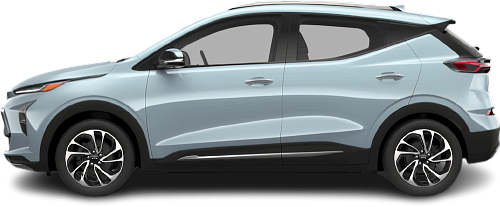USA EV Comparison: Hyundai Kona Electric Long Range vs Chevrolet Bolt EUV Gen 1
Struggling to Decide? Let AI Help!
Your AI Summary Is Ready!
General Info
Since both vehicles have been discontinued, they are now only available on the used car market. You can get the Hyundai Kona Electric Long Range (2021-2023) for as low as $13500, while the Chevrolet Bolt EUV Gen 1 (2022-2023) begins at $11433.
The two vehicles share the same body style: SUV.
| Property | Hyundai Kona Electric Long Range | Chevrolet Bolt EUV Gen 1 |
|---|---|---|
| Years of Production | 2021-2023 | 2022-2023 |
| Current Status | Discontinued | Discontinued |
| Country of Manufacture | Czech Republic, India, South Korea | USA |
| Body Style | SUV | SUV |
| Market Availability | EU, USA | USA |
| Price USA (Used) | $13500 | $11433 |
| GCC Score | 5.9 | 5.8 |
Range and Efficiency
The Hyundai Kona Electric Long Range (2021-2023) boasts a greater real-world range, a larger battery, and superior energy efficiency compared to the Chevrolet Bolt EUV Gen 1 (2022-2023).
| Property | Hyundai Kona Electric Long Range | Chevrolet Bolt EUV Gen 1 |
|---|---|---|
| Range (EPA) | 258 mi | 247 mi |
| Range (WLTP) | 301 mi | - Range (WLTP) |
| Range (GCC) | 250 mi | 235 mi |
| Battery Capacity (Nominal) | 67.5 kWh | 65 kWh |
| Battery Capacity (Usable) | 64 kWh | 61.8 kWh |
| Efficiency per 100 mi | 25.6 kWh/100 mi | 26.3 kWh/100 mi |
| Efficiency per kWh | 3.91 mi/kWh | 3.8 mi/kWh |
| Range and Efficiency Score | 7.5 | 7 |
Charging
Both vehicles utilize a standard 400-volt architecture.
The Hyundai Kona Electric Long Range (2021-2023) offers faster charging speeds at DC stations, reaching up to 77 kW, while the Chevrolet Bolt EUV Gen 1 (2022-2023) maxes out at 55 kW.
The Chevrolet Bolt EUV Gen 1 (2022-2023) features a more powerful on-board charger, supporting a maximum AC charging power of 11.5 kW, whereas the Hyundai Kona Electric Long Range (2021-2023) is limited to 7.2 kW.
| Property | Hyundai Kona Electric Long Range | Chevrolet Bolt EUV Gen 1 |
|---|---|---|
| Max Charging Power (AC) | 7.2 kW | 11.5 kW |
| Max Charging Power (DC) | 77 kW | 55 kW |
| Architecture | 400 V | 400 V |
| Charge Port | CCS Type 1 | CCS Type 1 |
| Charging Score | 5 | 6 |
Performance
Both vehicles are front-wheel drive.
Both cars offer the same motor power, but the Chevrolet Bolt EUV Gen 1 (2022-2023) achieves a faster 0-60 mph time.
| Property | Hyundai Kona Electric Long Range | Chevrolet Bolt EUV Gen 1 |
|---|---|---|
| Drive Type | FWD | FWD |
| Motor Type | PMSM | PMSM |
| Motor Power (kW) | 150 kW | 150 kW |
| Motor Power (hp) | 201 hp | 201 hp |
| Motor Torque | 291 lb-ft | 266 lb-ft |
| 0-60 mph | 7.6 s | 7 s |
| Top Speed | 104 mph | 91 mph |
| Performance Score | 3.8 | 3.5 |
Dimensions
The Chevrolet Bolt EUV Gen 1 (2022-2023) is longer and taller, but about the same width as the Hyundai Kona Electric Long Range (2021-2023).
The Chevrolet Bolt EUV Gen 1 (2022-2023) boasts a more extended wheelbase.
| Property | Hyundai Kona Electric Long Range | Chevrolet Bolt EUV Gen 1 |
|---|---|---|
| Length | 165.6 in | 169.5 in |
| Width (with Mirrors) | 81.5 in | - Width (with Mirrors) |
| Width (w/o Mirrors) | 70.9 in | 69.7 in |
| Height | 61.8 in | 63.6 in |
| Wheelbase | 102.4 in | 105.3 in |
Cargo and Towing
The Hyundai Kona Electric Long Range (2021-2023) features a larger trunk, but the Chevrolet Bolt EUV Gen 1 (2022-2023) offers greater maximum cargo capacity when the rear seats are folded.
Neither car is equipped with a frunk (front trunk).
The Hyundai Kona Electric Long Range (2021-2023) has a towing capacity of up to 661 lb, whereas the Chevrolet Bolt EUV Gen 1 (2022-2023) is not officially rated for towing in the US.
| Property | Hyundai Kona Electric Long Range | Chevrolet Bolt EUV Gen 1 |
|---|---|---|
| Number of Seats | 5 | 5 |
| Curb Weight | 3715 lb | 3680 lb |
| Cargo Volume (Trunk) | 19.2 ft3 | 16.3 ft3 |
| Cargo Volume (Max) | 45.8 ft3 | 56.9 ft3 |
| Cargo Volume (Frunk) | - Cargo Volume (Frunk) | - Cargo Volume (Frunk) |
| Towing Capacity | 661 lb | - Towing Capacity |
| Cargo and Towing Score | 5.7 | 6 |




